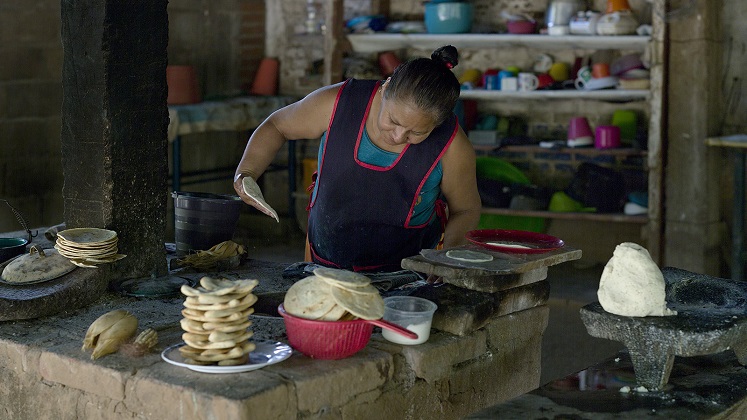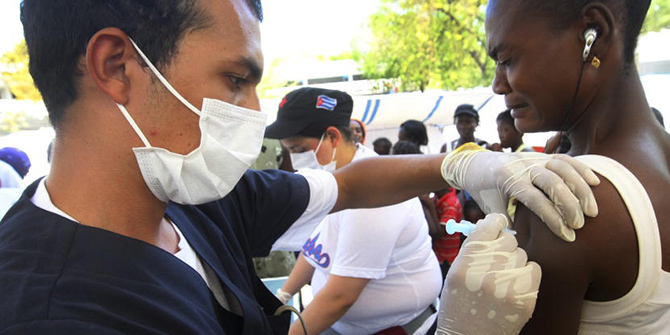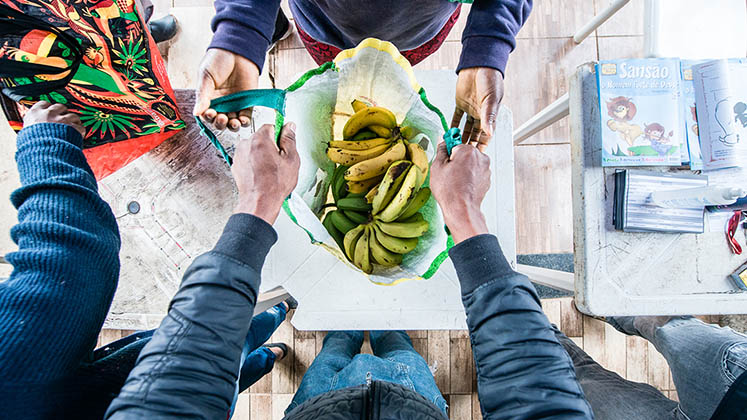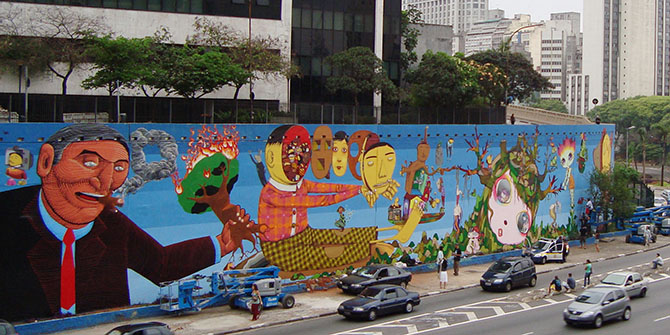 Bolivians in Chile face discrimination in multiple aspects of their everyday lives, but Chile can avoid the anti-migrant politics on the rise in the US and Europe by taking the lead on inclusive, intercultural, human-rights based migration policies, writes Megan Ryburn.
Bolivians in Chile face discrimination in multiple aspects of their everyday lives, but Chile can avoid the anti-migrant politics on the rise in the US and Europe by taking the lead on inclusive, intercultural, human-rights based migration policies, writes Megan Ryburn.
Her youngest child distracted with pens and paper, Constanza and I sat and talked about her difficulties finding housing in Santiago, Chile, after moving there from Sucre in Bolivia. With no possibility of going through more formal channels because of a lack of payslips and a guarantor, she had gone door-to-door in downtown Santiago, desperate to rent a room in a tenement block for her and her family. She faced repeated, and sometimes aggressive, rejection on the grounds of being foreign and having small children.

In the north of Chile, in Arica, I spoke to Isabela, originally from La Paz, who worked at a flower stall. She expressed how hard she had found trying to access the healthcare to which she was entitled in Chile, referencing the condescending attitudes of some medical clinic staff. She attempted to account for it by saying, “Maybe because we have the look of ‘humble people’ and we don’t know how to express ourselves very well, some specific words that the doctor wants … we go with the words that we learn there in Bolivia, with those words, and they don’t understand.”
On an agricultural smallholding, also in the north, migrant workers told me about the long hours they put in pruning and picking peppers and tomatoes, six and a half days a week, at a rate below the minimum wage. Explaining how they were treated by the overseers, one worker said, “Because you’re a foreigner they … want to make you work more, without stopping. They say you’re not advancing, that you have to hurry.” Most of the workers were indigenous Aymara from rural Bolivia, and faced an additional layer of racism as a consequence. The owner of one smallholding, for example, informed me that he believed Aymara Bolivians to be “slow-witted and unable to take initiative.”
These, and many other similar incidents, were the daily bread of the Bolivian migrants with whom I carried out research in Santiago and Arica. To varying degrees but without exception, all had faced discrimination in relation to multiple aspects of their everyday lives.
Migration is becoming an increasingly salient issue in Chile. Whilst still making up only a small percentage of the country’s total population – at 2.7 per cent – the number of migrants in Chile has more than quadrupled since the early 1990s. People are drawn by the often unfulfilled promise of higher wages, as well as Chile’s relative social and political stability. In 2015, according to data from the National Socioeconomic Characterisation Survey, there were roughly 465,000 migrants in Chile, of which almost 90 per cent were from other Latin American countries. The majority come from Peru, Argentina, Colombia, Bolivia, and Haiti, with the share of the latter three countries – and especially Haiti – growing steadily over the past five years.

As the foreign-born population in Chile has grown, so too have expressions of xenophobia and intolerance. Discrimination towards migrants, particularly those who are indigenous or Afro-descendant, has always been present, but sadly it appears to have intensified in recent years. This is evident not only in the kinds of incidents described above, in xenophobic graffiti in migrant neighbourhoods, and in racist abuse on public transport, it has also begun to seep into political discourse.
This was clear in the anti-migrant comments made by former president and current presidential candidate Sebastián Piñera in late 2016, which linked migrants with delinquency and called for tougher immigration laws. Piñera’s assertions were made in relation to the pressing need to revise Chile’s current migration legislation, which is piecemeal at best and leaves ample room for arbitrary and discriminatory decision-making.
As a human rights lawyer in Chile told me, Decree Law 1094, the most important legal instrument currently governing migration in Chile, “is a norm dictated under the state of exception in the year 1975 [during the Pinochet dictatorship], which establishes a police regime … with regards to foreigners in Chile.”
Whilst there have been some very important changes to migration law over time, the exclusionary foundations of Decree Law 1094 still permeate the application processes for residency and naturalisation (see also my co-authored post on the Leiden Law Blog). Visa application fees, for example, can be prohibitively high for low-wage migrants of particular nationalities, such as Bolivians. The visa system also places significant power in the hands of employers, which can lead to exploitation of migrant workers. Moreover, a complex bureaucracy makes it very difficult for some migrants to understand the application process, and understanding is not always facilitated by public officials. Diana, a migrant interviewee, told me, “They attend you very badly in all honesty, and it makes you not want to ask anything.”
In migrants’ daily lives, the uncertain legal citizenship that this legislation can generate may be combined with, and co-produce, uncertainty across other dimensions of their cross-border citizenship. Thus, as the examples at the beginning of this post indicate, and as I discuss in the book I am currently working on, migrants often also face exclusion from social and economic citizenship – that is, from accessing substantive rights to shelter, healthcare, education, and decent work. Their ability to participate as political citizens, both formally and informally, can also be constrained.
As others like Miguel Yaksic, SJ, National Director of the Servicio Jesuita a Migrantes, have argued, tackling these myriad issues will require migration legislation that is more, not less, inclusive. Furthermore, it is imperative to stop the delay on debating and passing this legislation. With a foundation of comprehensive legislation, incremental action could more easily be taken to address the types of everyday discrimination that have seen Constanza and her family to struggle to find housing, caused Isabela to experience problems accessing healthcare, and led to the exploitation of agricultural workers.
As a migrant destination of growing importance in Latin America, and as a member of the OECD, the next few years present Chile with a significant opportunity. This is the time to eschew the anti-migrant politics on the rise in the US and Europe and to lead with inclusive, intercultural, human-rights based migration policies and practices. There already exists some political will to advance towards these kinds of reforms, with significant support also coming from the third sector and sections of the general public.
Now is the time to heed Constanza’s reply when I concluded our interview by asking what she would most like to see improve for migrants in Chile. Looking across at her little boy, she said simply, “I wish they’d show us more solidarity”.
Notes:
• The views expressed here are of the authors rather than the Centre or the LSE
• Pseudonyms have been used to protect the identity of research participants
• Please read our Comments Policy before commenting





